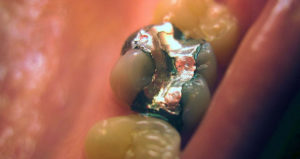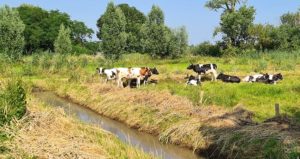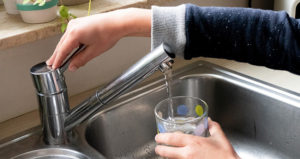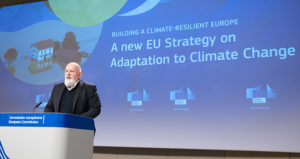European Commission steps up towards zero pollution in 2050
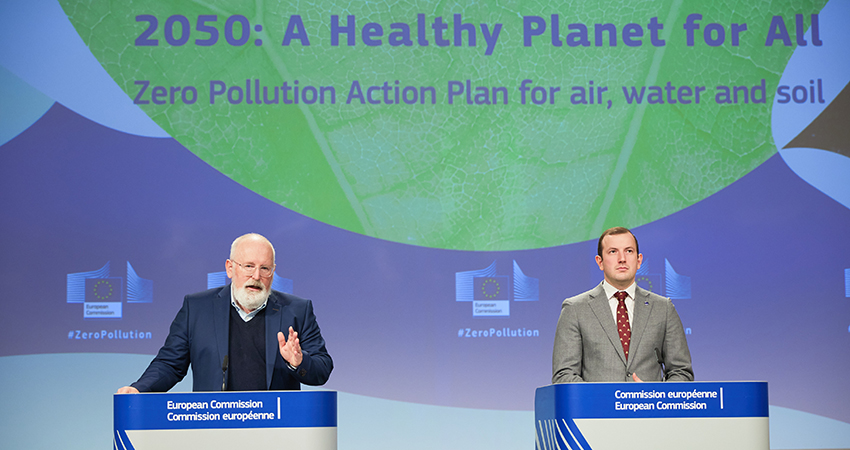
-
 Esther Rasenberg
Esther Rasenberg
Share article:
‘Towards Zero Pollution for Air, Water and Soil in 2050’. It is the ultimate goal of an ambitious plan presented by the European Commission (EC) the 12th of May. The targets for water in 2030 are to reduce waste and plastic litter at sea by 50% and microplastics released into the environment by 30%. The zero pollution vision for 2050 is to reduce all levels of pollution until they are no longer harmful to health and natural ecosystems.
To create a toxic free environment the plan ties together all relevant EU policies to tackle and prevent pollution, with a special emphasis on how to use digital solutions. Executive Vice-President for the European Green Deal Frans Timmermans and Commissioner for the Environment, Oceans and Fisheries Virginijus Sinkevičius explained which steps are needed to get to zero pollution in 2050. The report refers to reviews of relevant EU legislation to identify remaining gaps in EU legislation. They also want to identify where better implementation is necessary to meet legal obligations.
Strengthen enforcement efforts
Part of the zero pollution plan is also reviewing the majority of EU waste laws to adapt them to the clean and circular economy principles. The European Commission also wants to introduce a ‘Scoreboard of EU regions’ green performance and they want to bring stakeholders together in a Zero Pollution Stakeholder Platform. Moreover the EC wants to focus on enforcement efforts on ensuring that all EU pollution prevention laws are effectively complied with. In order to do so they want to strengthen the Environmental Crime Directive, can be read in the report.
New Drinking Water Directive
According to the European Commission the revised Drinking Water Directive will provide from January 2023 higher human health protection thanks to more stringent water quality standards, tackling pollutants of concern, such as endocrine disruptors and microplastics, and leading to even cleaner water from the tap for all – and less need for plastic bottles. In October 2020 the European Commission already adopted a new Chemicals Strategy towards a toxic free environment.
Reviews
The European Commission will assess by 2023 whether new parameters also need to be addressed in the ongoing review of the Bathing Water Directive. Under the forthcoming review of the Urban Waste Water Treatment Directive, the possibility of introducing permanent monitoring of health relevant parameters in wastewaters will be analysed. This could help prepare us for any new epidemic threats.
Reducing chemicals and microplastics
Reviewing and modernising other water and marine laws, notably to make them better fit to reduce chemical contaminants and microplastics, will also help preserve the quality of the water we drink and the seafood we eat. The EC identified, in the farm to fork strategy, actions which will contribute to moving towards zero-pollution in food systems, such as the new strategic guidelines for EU aquaculture.
Updating lists of substances
Updating the lists of problematic substances for surface water and groundwater will protect nature and human health from the most relevant substances based on the most up-to-date scientific insights. In parallel, the Commission will continue promoting the creation of Emission Control Areas across all EU seas to improve the air breathed on ships and in port cities and coastal areas, and the quality of the seas we bathe in.
Act now
Timmermans said: “To provide a toxic-free environment for people and planet, we have to act now. This plan will guide our work to get there.” New green technologies already here can help reduce pollution and offer new business opportunities. Europe’s efforts to build back a cleaner, fairer, and more sustainable economy must likewise contribute to achieving the zero pollution ambition.”



